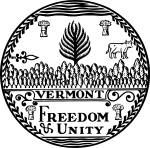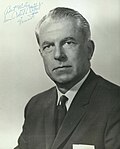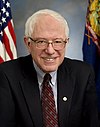
The 1972 United States Senate elections were held on November 7, with the 33 seats of Class 2 contested in regular elections. They coincided with the landslide re-election of Republican President Richard Nixon. Despite Nixon's landslide victory, Democrats increased their majority by two seats. The Democrats picked up open seats in Kentucky and South Dakota, and defeated four incumbent senators: Gordon Allott of Colorado, J. Caleb Boggs of Delaware, Jack Miller of Iowa, and Margaret Chase Smith of Maine. The Republicans picked up open seats in New Mexico, North Carolina, and Oklahoma, and defeated one incumbent, William B. Spong Jr. of Virginia.

The 1970 United States Senate elections was an election for the United States Senate. It took place on November 3, with the 33 seats of Class 1 contested in regular elections. Special elections were also held to fill vacancies. These races occurred in the middle of Richard Nixon's first term as president. The Democrats lost a net of three seats, while the Republicans and the Conservative Party of New York picked up one net seat each, and former Democrat Harry F. Byrd Jr. was re-elected as an independent.

Robert Theodore Stafford was an American politician from Vermont. In his lengthy political career, he served as the 71st governor of Vermont, a United States representative, and a U.S. Senator. A Republican, Stafford was generally considered a liberal, or "Rockefeller Republican".

Winston Lewis Prouty was an American politician. A member of the Republican Party, he served as a United States Senator from Vermont from 1959 until his death. He was previously a member of the United States House of Representatives, serving Vermont's At-large congressional district, from 1951 to 1959.

George Herbert Prouty of Newport, Vermont, was a Republican member of the Vermont House of Representatives from 1896 to 1897; a member of Vermont State Senate from 1904 to 1906; the 46th lieutenant governor of Vermont from 1906 to 1908; the 52nd governor of Vermont from 1908 to 1910; and Delegate to the 1916 Republican National Convention.

Lee Earl Emerson was an American politician who served in both the Vermont House of Representatives and the Vermont Senate. A member of the Republican Party, he was the 63rd Lieutenant Governor of Vermont and the 69th governor of Vermont. When he was first elected in the 1950 Vermont gubernatorial election, he received over 70% of the vote, something no Republican since has equaled. Despite his success in 1950, he lost the Republican primary for U.S. Senate in Vermont in 1958 to Congressman Winston L. Prouty. He also lost the 1960 primary for Vermont's seat in the U.S. House of Representatives to incumbent Governor Robert T. Stafford.

The Vermont Senate is the upper house of the Vermont General Assembly, the state legislature of the U.S. state of Vermont. The senate consists of 30 members elected from multi-member districts. Each senator represents at least 20,300 citizens. Senators are elected to two-year terms and there is no limit to the number of terms that a senator may serve.

Richard Walker Mallary was an American businessman and politician. He served for three years as a U.S. Representative from Vermont and was the Republican nominee for United States Senator in 1974, losing narrowly to Patrick Leahy. He died by suicide with terminal prostate cancer on September 27, 2011.

Charles Azro Prouty was an American Republican politician and government official who was involved with reform movements including the Progressive and Prohibition Parties. He served as a commissioner of the Interstate Commerce Commission (ICC) from 1896 to 1914. He was an unsuccessful candidate for the United States Senate from Vermont in 1914, losing to incumbent Republican senator William P. Dillingham.
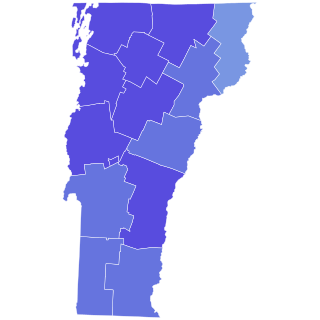
The 1998 United States Senate election in Vermont was held November 3, 1998. Incumbent Democratic U.S. Senator Patrick Leahy won reelection to a fifth term.

The 1908 Vermont gubernatorial election took place on September 1, 1908. Incumbent Republican Fletcher D. Proctor, per the "Mountain Rule", did not run for re-election to a second term as Governor of Vermont. Republican candidate George H. Prouty defeated Democratic candidate, Burlington mayor James Edmund Burke to succeed him.

The 1988 United States Senate election in Vermont took place on November 8, 1988. Incumbent Republican Robert Stafford did not run for re-election to another term in the United States Senate. Republican candidate Jim Jeffords defeated Democratic candidate Bill Gray to succeed him.
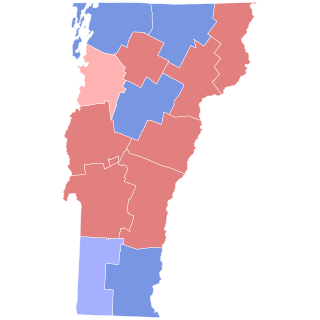
The 1982 United States Senate election in Vermont took place on November 2, 1982. Incumbent Republican Robert Stafford successfully ran for re-election to another term in the United States Senate, defeating Democratic candidate James A. Guest. This election marks the last time a Democrat won any counties in a race for Vermont's Class 1 US Senate seat, as well as the last time the winner of the seat did not win every county in the state.

The 1976 United States Senate election in Vermont took place on November 2, 1976. Incumbent Republican Robert Stafford successfully ran for re-election to another term in the United States Senate, defeating Democratic candidate Governor Thomas P. Salmon.

The 1970 United States Senate election in Vermont took place on November 3, 1970. Incumbent Republican Winston L. Prouty successfully ran for re-election to third term in the United States Senate, defeating Former Democratic Governor Philip H. Hoff.

The 1964 United States Senate election in Vermont took place on November 3, 1964. Incumbent Republican Winston L. Prouty successfully ran for re-election to another term in the United States Senate, defeating Democratic candidate Frederick J. Fayette.
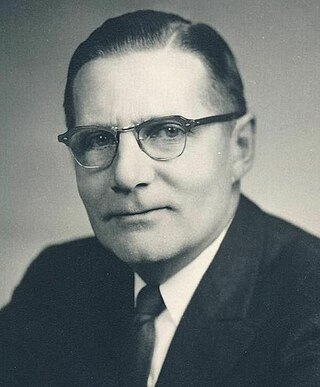
The 1958 United States Senate election in Vermont took place on November 4, 1958. Incumbent Republican Ralph Flanders did not run for re-election to another term in the United States Senate. Republican candidate Winston L. Prouty defeated Democratic candidate Frederick J. Fayette to succeed him.
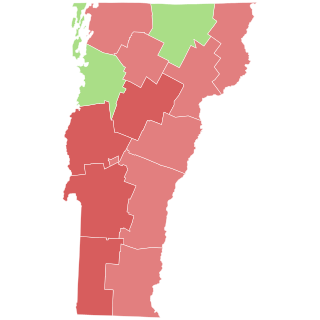
The 1914 United States Senate election in Vermont took place on November 3, 1914. Incumbent Republican William P. Dillingham successfully ran for re-election to another term in the United States Senate, defeating Charles A. Prouty. This was the first United States Senate direct election to take place in Vermont following the ratification of the Seventeenth Amendment to the United States Constitution.

The 1988 United States House of Representatives election in Vermont was held on November 8, 1988. Republican nominee Peter Plympton Smith defeated independent candidate Bernie Sanders and Democratic nominee Paul N. Poirier.
Frank Elliott Barber Jr. was a Vermont attorney and politician who served as Vermont Attorney General from 1953 to 1955.

